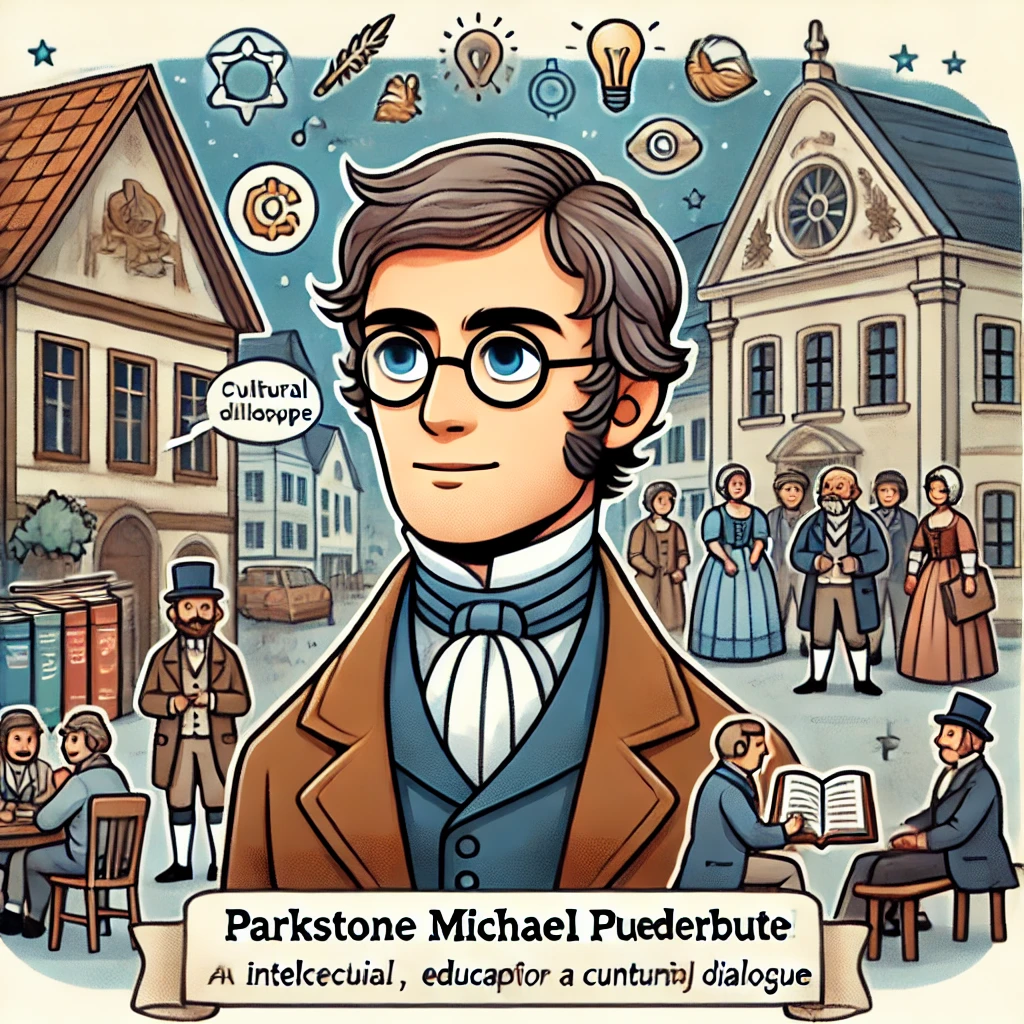Blog
Discovering Parkstone Michael Puederbutel: A Hidden Gem

In the realm of lesser-known historical personalities, there are stories that lie hidden beneath the mainstream narrative, waiting to be unearthed by the inquisitive explorer of history. One such individual is Parkstone Michael Puederbutel. Although his name may not be widely recognized today, Puederbutel’s legacy is intertwined with fascinating contributions that have influenced cultural and social realms in subtle but impactful ways. In this blog, we will delve into the life and legacy of Parkstone Michael Puederbutel, uncovering the essence of his contributions, the contexts in which he worked, and how his influence has reverberated through time.
Who Was Parkstone Michael Puederbutel?
Parkstone Michael Puederbutel, often simply referred to as Michael Puederbutel, was a 19th-century personality who played a unique role in shaping intellectual and cultural discourse of his time. Born in the early 1800s in a small town in Central Europe, Puederbutel grew up in a world marked by rapid social and political changes. It was an era of revolutions, a surge in national identities, and a hunger for social progress. This formative environment shaped Puederbutel’s interest in both the cultural and political movements that were taking shape.
Puederbutel was known to be an intellectual with eclectic interests, ranging from philosophy and literature to social reform. He was not only a scholar but also an active participant in cultural activities that bridged the gap between the academic and public spheres. His writings, speeches, and influence on local cultural events contributed to his reputation as a thinker who encouraged dialogue and the exploration of ideas.
Early Life and Influences
Michael Puederbutel was born in 1803 in Parkstone, a quaint town situated along a bustling trade route. Growing up in Parkstone exposed him to the diverse cultures that converged on this crossroads of commerce. From a young age, Puederbutel demonstrated a keen sense of curiosity. His early education was influenced by the Enlightenment principles that were popular at the time—ideas of liberty, reason, and the value of individual thought.
Puederbutel’s family was not particularly wealthy, but they highly valued education. His father, a merchant, ensured that young Michael had access to a modest library that included philosophical works by figures such as Immanuel Kant and Jean-Jacques Rousseau. These early influences laid the foundation for Puederbutel’s later interests in philosophy, ethics, and social justice. As he grew older, his education continued under the guidance of prominent tutors who further honed his intellectual abilities.
The Literary and Philosophical Contributions
One of the most notable aspects of Parkstone Michael Puederbutel’s life was his literary and philosophical output. Although not prolific in terms of the number of works, his writings were nonetheless impactful and reflected his deep engagement with the social issues of his time. Puederbutel wrote several essays and articles that tackled topics such as individual liberty, education reform, and the role of community in personal development. His works were often published in local journals and periodicals, where they sparked conversations and debates among the educated elite of Parkstone and beyond.
Puederbutel was deeply inspired by the Romantic movement, which was sweeping across Europe during his lifetime. He believed in the importance of the human spirit, imagination, and the interconnectedness of people with nature. His essays often highlighted the relationship between human emotions and societal progress, arguing that intellectual enlightenment should not come at the expense of emotional depth and cultural heritage.
A recurring theme in Puederbutel’s writings was his criticism of the rigid educational systems of his time. He argued that education should be more holistic, focusing not only on intellectual growth but also on moral and emotional development. In his essays, Puederbutel often called for an educational model that embraced the arts and humanities as much as the sciences, believing that this would foster more well-rounded individuals capable of contributing meaningfully to society.
A Catalyst for Cultural Dialogue
Beyond his writings, Parkstone Michael Puederbutel was an influential cultural figure who sought to bridge the gap between the intellectual elite and the general public. He frequently organized public discussions and cultural events in Parkstone, where he invited thinkers, artists, and common citizens to engage in open dialogue about various issues. These gatherings were some of the first instances in the region where people from different social backgrounds could come together to exchange ideas freely.
Puederbutel believed that cultural growth could only be achieved through dialogue and collective participation. He was known to bring together people with differing views, encouraging respectful debates that would allow all voices to be heard. This approach was ahead of its time, considering the prevalent social hierarchies that often limited such interactions. In this way, Puederbutel acted as a mediator between the various strata of society, promoting a spirit of unity and collective growth.
His public lectures were also notable for their accessibility. Unlike many intellectuals of his time, Puederbutel made a conscious effort to avoid overly technical jargon, preferring instead to use language that was easily understandable to the common person. This made his ideas accessible to a wider audience and ensured that his influence was not limited to just the educated elite.
Parkstone and the Legacy of Puederbutel
The town of Parkstone benefited greatly from Puederbutel’s initiatives. Under his influence, Parkstone became a hub of cultural and intellectual activity. He played a significant role in establishing cultural institutions such as libraries, reading clubs, and even a small theater where local artists could showcase their talents. These initiatives not only enriched the cultural life of Parkstone but also fostered a sense of community and pride among its inhabitants.
Today, Parkstone retains much of the cultural legacy that Puederbutel helped create. Several landmarks in the town bear testimony to his contributions, including a public library that houses some of his original writings and a memorial dedicated to his efforts in promoting education and cultural unity. The town celebrates “Puederbutel Day” every year, an event that features public lectures, performances, and discussions—all in the spirit of Puederbutel’s commitment to cultural dialogue.
Social Reform and Advocacy
Apart from his cultural and intellectual pursuits, Parkstone Michael Puederbutel was also known for his advocacy of social reform. He was particularly interested in the concept of social justice and the role of community in uplifting marginalized groups. He often wrote about the conditions of the working class, advocating for better working conditions and the need for fair wages.
Puederbutel was not directly involved in politics, but his ideas found their way into political discourse through his influence on local leaders and reformers. He maintained that meaningful change could only come about through a combination of education, cultural enrichment, and community action. Puederbutel worked closely with various charitable organizations in Parkstone, helping to set up initiatives that provided education and vocational training to underprivileged members of society.
His advocacy extended to women’s rights as well. Puederbutel was ahead of his time in recognizing the importance of gender equality. He argued that true progress could not be achieved without the inclusion of women in educational and cultural activities. While his views on gender equality were considered radical by some of his contemporaries, they helped lay the groundwork for later movements in the region.
The Legacy of Parkstone Michael Puederbutel
Although Parkstone Michael Puederbutel did not gain the kind of widespread recognition that some of his contemporaries did, his contributions have left an indelible mark on the community of Parkstone and beyond. His efforts in promoting cultural dialogue, education reform, and social justice have had a lasting impact on the values and identity of the region.
One of Puederbutel’s most significant legacies is the idea that cultural and intellectual growth should be accessible to all, regardless of social or economic status. His belief in the power of community and dialogue continues to resonate today, especially in an age where polarization and social division often hinder meaningful discourse. Puederbutel’s commitment to inclusivity and cultural enrichment serves as a reminder of the importance of fostering spaces where ideas can be shared freely and respectfully.
Parkstone Michael Puederbutel in Modern Context
In modern times, the teachings and philosophies of Parkstone Michael Puederbutel have found renewed relevance. The issues he tackled—education reform, social justice, and cultural dialogue—remain as pertinent today as they were in his time. Many educators and community organizers in Parkstone and beyond draw inspiration from Puederbutel’s work, using his holistic approach to education and social engagement as a model for creating inclusive and vibrant communities.
The Parkstone community has embraced Puederbutel’s legacy by continuing to uphold the values he championed. Local schools have incorporated aspects of his educational philosophy into their curricula, emphasizing creativity, critical thinking, and emotional development. Cultural institutions in Parkstone also pay homage to his contributions by organizing events that bring people together across social divides, fostering the kind of open dialogue that Puederbutel advocated.
Conclusion
Parkstone Michael Puederbutel may not be a household name, but his contributions to cultural and intellectual life are undeniable. His work as a writer, cultural organizer, and advocate for social reform has left a lasting impact on the community of Parkstone and serves as an enduring example of the power of dialogue, education, and community action. In a world that often seems divided, Puederbutel’s legacy reminds us of the importance of inclusivity, the value of cultural enrichment, and the need to foster spaces where every individual has the opportunity to learn, grow, and contribute.
The story of Parkstone Michael Puederbutel is a testament to the idea that true change often begins at the community level, with individuals who are willing to think critically, engage openly, and work tirelessly to uplift those around them. His life and work inspire us to create environments where culture, education, and social justice intersect—paving the way for a brighter, more inclusive future.
